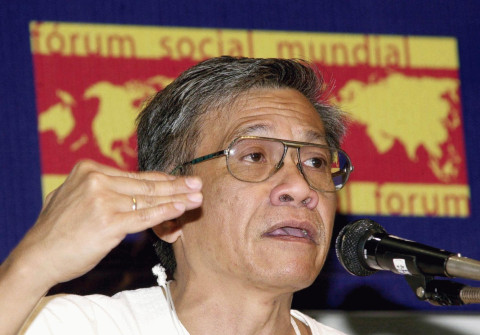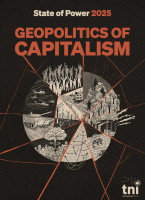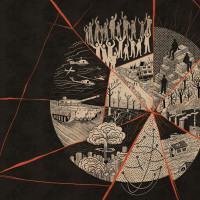‘Resentment is fuelling the rise of the right.’
Topics
Walden Bello is one of the world’s leading scholar-activists on globalization and the decline of US imperialism in the Global South. In an interview with Jacobin about his memoirs, he talks about the imperial overstretch of the US, the devastating effects of ‘structural adjustment,’ and the possibilities of the BRICS for ending the debt crisis of the Global South.

Marcello Casal Jr. / Agência Brasil, CC BY 3.0 BR <https://creativecommons.org/licenses/by/3.0/br/deed.en>, via Wikimedia Commons
These are confusing political times. For decades, “alterglobalists” fought against the dictates from the World Bank, the International Monetary Fund, and the World Trade Organization. Under these institutions of US-led global capitalism, states had to lift tariffs on imports and open up their markets for foreign companies. Active industrial policy was out of the question, and euphemistically named “structural adjustment programs” imposed from the outside caused havoc in the Global South. Millions lost their jobs as local manufacturers were driven out of business by global competition.
The contradiction: now the US government, previously the lead actor in globalization, is itself busily dismantling these same institutions. As both American and European leaderships put up new barriers, and their supremacy is threatened especially by Asian powers, the idea of capitalist globalization no longer rules the roost as it did at the turn of the millennium. So, has the Trumpite right stolen the critique of globalization from its former socialist partisans?
In fact, there are essential differences between their criticisms, emphasizes the Filipino activist-intellectual Walden Bello (80). Deglobalization, as he and his colleagues from the Global South conceived it, was about creating economies that were just and would reduce inequality and exploitation – it would definitely not protect and benefit the most powerful countries.
Economic decisions must be taken at the lowest level possible, says Bello: subsidiarity is essential. And an economy must exist for its community, based on common values such as democracy, justice, and human rights.
The far right perverted this idea. “The right sees people as members of a community on the basis of blood, skin colour, ethnicity, or religion. Only based on those criteria could you become a member of the community. And that is an exclusionary community, one contradicting our view, which is that community is inclusive, open to all who share the same values, like justice, democracy, and human rights. That’s really the big difference. They have misappropriated this dimension of deglobalization and we reject the idea that people have only rights or belong to a community if they have the "proper" physical or cultural characteristics.”
Solidarity, inclusivity, and fighting against politicians and corporations who think they play dice with the lives of ordinary people: these are Bello’s values, which repeatedly recur in his recently published memoirs Global Battlefields. Memoir of a Legendary Public Intellectual from the Global South1. Born in 1945 in the Philippines, Bello studied sociology at Princeton University at the end of the 1960s, where he also obtained his PhD. There he got into contact with the anti-Vietnam War movement. Faced with American imperialism in the belly of the beast, Bello became a member of the Maoist Communist Party of the Philippines (CPP) and fought against the US-backed dictator Ferdinand Marcos in his homeland.
One of his most important lessons was that institutions such as the World Bank and the IMF play crucial roles in sustaining US imperialism. It was the World Bank, with the US as its largest funder, that helped Marcos stay in power. With clever burglaries in the World Bank’s Washington D.C. headquarters, Bello and his comrades obtained 6,000 pages of revealing documents about financial support to Marcos’s dictatorship.
At the end of the 1980s, after Marcos’s overthrow, Bello bid farewell to the CPP and broadened his intellectual scope to the whole Global South. As one of the founders of the think tank Focus on the Global South, he became one of the most influential activist-intellectuals opposed to the Washington Consensus policies of liberalization, deregulation, and privatization. With his publications – including twenty-five books – Bello provided intellectual fuel for the resistance against the capitalist world order, and he helped to discredit neoliberalism as ‘the only remaining ideology.’ It was thus that author and activist Naomi Klein called Bello ‘the world’s leading no-nonsense revolutionary.’
In 2023 he received the Right Livelihood Award – also known as ‘the Alternative Nobel Prize’ – for his contribution to educating civil society about the effects of corporate globalization and helping envision and implement alternatives. From 2009 to 2015, Bello was a member of the Philippines’ House of Representatives for Akbayan. As an MP he fought for the interests of Filipinos working abroad and against the presence of US military forces in Asia.
Bello sees that the dismantling of US global hegemony offers opportunities for new politics with a more equal distribution of power and resources around the globe.
In the face of the crumbling neoliberal global economy, liberals and social democrats in Europe are mostly busy slowing down this process. They plead for a ‘return to normal,’ without recognizing that ‘normal politics and economics’ were the problem. How come they lack the ideas or the language to fight for a new economic order, one without exploitation of humans, nature, and the planet?
“You are definitely right that they have basically given in to the basic propositions of neoliberalism, which is to judge everything in terms of narrow efficiency, or reduction of unit costs,” says Bello. That leads to a one-dimensional society in which the possibility to create communities is made impossible. “Neoliberalism has really theoretically disengaged individuals from one another. And they do not have, indeed, a sense that human beings and human relations need to be evaluated on more than just efficiency. That’s why you have a tremendous reaction to neoliberalism, because people are not just aggregates of individuals.”
The Right succeeded, according to Bello, in capturing people who are left behind, also from the working class, for its cause, because they didn’t feel part of a community. “They no longer feel part of a bigger thing and the right wing has come and captured them. But it is a perverted community, based on blood and skin colour.”
As long as the left and progressives are not capable of imagining and promoting a different society in which there is space for communities based on solidarity instead of efficiency, the right will attract people with its xenophobic and nativist idea of community, says Bello. “People feel they have been left out. Resentment is fuelling the rise of the right. That’s why we must take the idea of community back from them, but then based on solidarity and progressive values.”
Labour export and exploitation
One of the underexposed results of neoliberal structural adjustment programs is large-scale labour migration: millions departed from countries in the Global South or left rural communities for fast-growing cities with major slums. Local economies didn’t offer jobs or income security. Governments supported the departure of young labour migrants: these exoduses released pressure to implement social reforms. Labour migrants also sent billions of dollars in remittances to their homelands. The Philippines is known as one of the largest exporters of labour migrants: Bello estimates that ten to twelve percent of the country’s population of around 118 million people works overseas. These overseas workers send around 45 billion dollars in remittances to the Philippines.
As the former head of the parliamentary Committee on Overseas Workers Affairs (COWA), Bello saw with his own eyes the effects of these labour exports. Filipinos mostly work in shipping, in healthcare in Europe and the USA, and in domestic work, especially in countries on the Arab Peninsula. Even the educational system in the Philippines is adjusted to the forecast that children will most likely work abroad. “Filipinos are mainly trained in the education system to serve needs abroad rather than domestically. What you are seeing is that the state is financing the education of people who then go abroad, so that basically the Philippine government is subsidizing the labour needs of other societies, like Europe and the Middle East. This is a very uneven kind of development that is also representative of many countries that dealt with structural adjustment.” Together with deindustrialisation and unemployment in the Global South, according to Bello, there is a growing need for labour, especially for healthcare, in the Global North, where the right is implementing an anti-migration policy.
Saudi Arabia is the country where the most Filipino labour migrants work and also where the levels of exploitation are the highest. “One of the first things I did as head of COWA was going to Saudi Arabia and document the exploitation of our people over there. And my committee came out with a report that said that we should not be sending our women to Saudi Arabia because they are exploited as slave labour in domestic situations, including sexual slavery. This was our suggestion, but the executive did not listen to us, although some other members of parliament did.”
With his work as head of COWA, Bello wanted to raise awareness and consciousness among fellow citizens: overseas workers can be exploited on a large scale. But he also saw that others had large interests in the labour export industry that countered his advocacy: recruiting agencies and the receiving governments wanted to maintain labour export and pressured the Philippine government to keep sending workers. According to Bello, the solution for this exploitation branch is a different economic model for the Philippines. “We must change the neoliberal orientation of our government and create domestic economic policies that create jobs. Our agriculture can flourish again, just like manufacturing and other sectors. With this, we can provide jobs for people instead of them having to leave.”
The return of US isolationism
The shock of Trump’s 2024 election victory still reverberates in European capitals, but the undermining of the trans-Atlantic world started already under President Obama. Together with his former Secretary of State Hillary Clinton, he began in 2011 to seek a confrontation with China as ‘the big challenger’ of American hegemony, known as the ‘Pivot to Asia’ policy. With Trump in the White House, the US reduces its forces in Europe, while at the same time forcing European NATO members to spend up to five percent of their GDP on military affairs. A large portion of this military spending will go to the American weapons industry, while it will cause budget cuts on social welfare, education, and health policies – or at least that’s what right-wing parties want. With the reduction of soldiers in Europe and corresponding military spending, the US can enlarge its presence in East Asia, among others in Japan, South Korea, and the Philippines; countries that find themselves at the forefront of American aggression against China.
Bello highlights, however, the hegemonic decline of the USA and its imperial overstretch over the last decades. “Part of that has been brought about by the resistance of the Global South. The WTO was an ambitious effort by the Global North, but it has been derailed as the main agency for trade liberalization by the alliance between global civil society and developing country governments. The rise of China has been very central: it is now the first or second largest economy, depending on the measure used. And the rise of China is inseparable from the deindustrialization of the United States. And then there are the 25 years when the United States tried to intervene in the Middle East, but it was not able to make that intervention a success. It lost Afghanistan and it lost in Iraq. This led effectively to a withdrawal from the Middle East, although the United States continues to support Israel.” With the reduction of active forces on the ground, the US will become less and less of an actor in the Middle East, foresees Bello.
Bello underlines that the United States, especially during the Biden administration, tried to contain China’s sphere of influence in East Asia with the presence of US military bases and soldiers, but he also discerns opposite movements. “The costs of keeping those bases in Japan, Korea, and the Philippines are high. There are sectors of Trump’s base that really don’t like to continue that sort of engagement, which has been promoted by liberal internationalists and neoconservatives in the United States. Many of the elites in Asia are now worried that the United States is eventually going to drop, or at least reduce, its military presence because of Trump’s base.” The isolationists in the United States, a major factor within the MAGA movement, emphasize, Bello says, that the US should focus on its presence in the Western Hemisphere; therefore he fears for the possible results of this policy for Latin America.
The bombing of Iran at the end of June evoked resistance in Trump’s MAGA base. “There is a big isolationist bloc within the United States that is forcing a limit to engagements abroad. Of course, Trump is very erratic and is zigzagging, but eventually I think he has to respond to this particular sense that the USA has to disengage, because it no longer has the resources to maintain economic and military hegemony. So that is where we are at this point in time.”
“We really need to monitor this very closely, because what we have is the emergence of a spheres-of-influence approach on the part of the United States, whereby Eastern Europe is seen as Russia’s sphere of influence. Western Europe is left on its own. Africa is now marginal to the interest of the political elites of the United States. In the Middle East it is basically supporting Israel and wants no further major US engagement. And South Asia, although Trump and Modi are ideological allies, is being seen as a Chinese sphere of influence.”
With his critique of US imperialism, with its system of international organizations in place to construct hegemony in a Gramscian understanding, Bello forces us to look beyond the spectacle of the ballot box: the project of American hegemony had always had bipartisan support. In June 2024 he wrote:
“True, the Harris-Trump battle may have contrasting ‘visions’ for the United States on domestic issues, but I ask, is it more of the same neoliberal pro–Wall Street/Silicon Valley policies cloaked with pious democratic rhetoric versus insurgent fascism that feeds on the failures of neoliberalism and liberal democracy? Fascism’s best ally is a liberal democratic elite that presides over an economic order that has radically increased inequality while piously asserting it is the best defence against fascism.”
But this comment feels harsh with the daily news about raids by ICE and Trump’s continued attacks on minority rights. There are also the huge budget cuts on USAID, the US government’s biggest provider of humanitarian aid around the globe. At the same time, it was also one of America’s most important tools in the fight for hearts and minds of the global population, a soft diplomacy instrument that worked as a distraction from the rough military power of imperialism.
The budget cuts on USAID led to huge crises in global healthcare. Large-scale programs to combat AIDS have been stopped. Recent research published in the medical journal The Lancet shows that the budget cuts led to 14 million additional deaths in 2030. Do you see other institutions, for example from the Global South, which can step up to prevent this humanitarian disaster?
“I do realize that there has been an impact in terms of US assistance to health systems in the Global South, which is why Trump and Musk dismantled USAID. Our reaction was to say that they dismantled the wrong institutions: they should have dismantled the World Bank, the IMF, and the different regional development banks because they created this poverty.” With the budget cuts on USAID, the American government took the wrong target, says Bello. In his ideal situation, the Global South shouldn’t need USAID: if they had their own economic resources for their health systems, help from the USA would not be necessary. For the transition period, Bello wants the United Nations to step in to prevent deadly outcomes from these budget cuts.
And what is your position on the International Criminal Court (ICC)? For a long period, only politicians from the Global South were prosecuted, while Western leaders were never held accountable by the ICC, which led critics to accuse the court of ‘neo-colonialism.’
“The International Court of Justice and the International Criminal Court are very important to push for ending genocidal and criminal policies. European countries were instrumental in the creation of these institutions, as were countries from the Global South. Lately, however, the rich countries are becoming more and more worried that these institutions are running out of their control and that the countries of the Global South are converting them into fora for global justice. You see this in the refusal of the United States to join the International Criminal Court. And it has opposed bringing Israel to trial before the International Court of Justice in The Hague. So I think these institutions can be very important to create global justice.”
The best way to describe the debts of the Global South is as a millstone around the neck of developing countries. Since the growth of indebtedness of these countries by financial institutions from the Global North from the 1980s, these debts are a major obstacle to global economic equality. It is a combination of the heritage of centuries of colonial rule and neo-colonial domination by international financial institutions. Debt relief and cancelling these debts have been one of Bello’s priorities for decades. With the rise of the BRICS, there are new possibilities for countries in debt traps to come out of their precarious situation.
Can the BRICS play a role in ending the continuing debt crises of the Global South?
“China has already been important in terms of dealing with the indebted countries. The IMF and Western countries, whose banks have played a great role in the debt crisis of developing countries, have been trying to get China to unite in a common front in a program for the Global South that would basically continue the old policies and continue to force them to pay exorbitant interest. China has refused to do that. In fact, China has already forgiven the debts of so many countries in the Global South. And it said: we don’t want to be part of a multilateral front that is coercive. China deals with debt on a bilateral basis. So China is now really the world’s largest development bank.”
“There are a number of countries, especially in the Middle East, with big sovereign wealth funds which can participate in relieving the debt burden of many countries in the Global South. There is always potential there. What kind of relationships would be established between these countries and the Global South? That remains to be seen. But I’m not saying that it’s impossible to have new relationships whereby debt is forgiven.”
Although the role of the BRICS will be partly unknown for Bello, it is clear to him that the declining American hegemony will create a political vacuum. A sign on the wall is the absence of the US at the Finance and Development conference in Seville last June and the Climate Conference in Bonn two weeks earlier. At both UN conferences, the chair for the USA remained empty.
“Whether the BRICS were there or not, development financing from the West and the North is dead. We saw that the USA didn’t participate in those conferences, so basically we depend on the instability of the Global North if we want to continue to engage with them. This response is, I think, a lost cause. The Global South needs to get those development funds and climate financing from elsewhere. It is a dead end at this point.”



